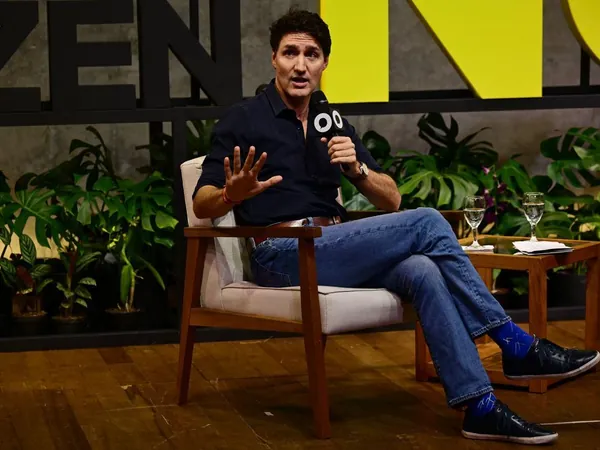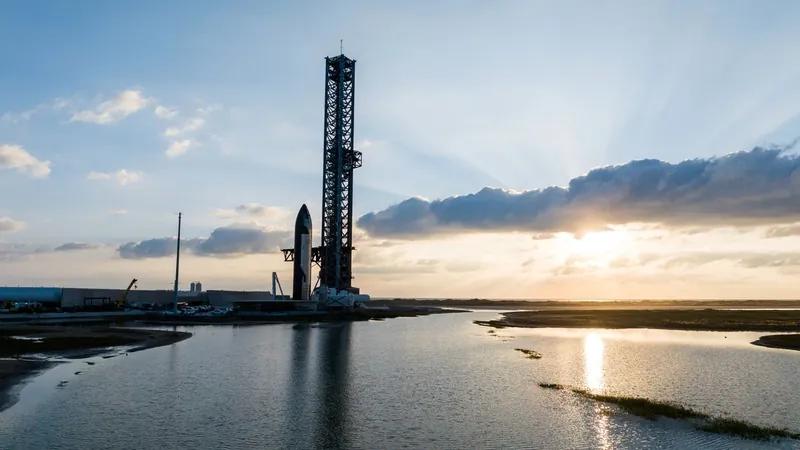
Trudeau's Carbon Tax Controversy: A Call for Sacrifice?
2024-11-20
Author: William
Introduction
In a recent appearance at the Global Citizen Now Event during the G20 Leaders’ Summit in Rio de Janeiro, Prime Minister Justin Trudeau urged Canadians to prioritize climate action—even if it means tightening their belts when it comes to basic needs like food and housing. His remarks have ignited a firestorm of debate over the feasibility and fairness of his government's climate policies.
Trudeau's Comments
Trudeau argued that it is "morally selfish" for Canadians to prioritize their immediate financial concerns over the urgent need to combat climate change. He stated, "It's really easy when you're in a short-term survival mode to say, 'Let's put climate change as a slightly lower priority.'" This rhetoric has left many wondering why he seems out of touch with the struggles faced by ordinary Canadians who find themselves grappling with rising living costs.
Criticism of Trudeau's Perspective
Critics were quick to point out that these comments come from a leader who has lived a privileged life and has never had to worry about making ends meet. Many Canadians argue they cannot focus on environmental issues when they are already strained by rent and grocery bills. Questions also arise about how any family, particularly those with lower incomes, can contribute to environmental goals while struggling to provide for their kids.
Claims About Climate Change Impact
Moreover, Trudeau went on to express dubious claims that climate change disproportionately affects women, suggesting they bear the brunt of its impacts. Critics have reacted with skepticism, questioning if natural disasters discriminate by gender rather than impacting families as a whole. This aspect of his speech only added to the sense of confusion and frustration regarding the government's messaging.
Economic Viability of Climate Policies
While Trudeau insists that a strong economy must be built alongside environmental protection, the practicality of his promises remains in question. Many Canadians are left wondering whether the jobs created through his government’s green initiatives will actually remain in Canada or simply benefit foreign stakeholders. The introduction of electric vehicle battery plants, for instance, has not been accompanied by transparent discussions about the long-term benefits to Canadian workers.
Repercussions of the Carbon Tax
Trudeau’s assertion that placing a price on pollution will effectively drive behavioral changes begs further examination. He asserts that most Canadians will actually see financial benefits from the government's carbon tax through rebates. However, critics fear that this approach may only alienate certain groups and lead to further division among Canadians, especially those struggling in an increasingly expensive economy.
Challenges Ahead
As the next election cycle approaches, Trudeau's government faces the challenge of convincing Canadians that climate policies will not only address environmental concerns but will also be fair and economically viable for all citizens. Many citizens express skepticism about the government’s transparency and ability to genuinely alleviate their financial burden while enforcing environmental initiatives.
Youth Perspectives
Trudeau may be hopeful about garnering the support of young people, but surveys suggest that many are more focused on immediate survival than long-term environmental goals. The “survival mode” that young and older citizens alike are experiencing brings into question the feasibility of Trudeau’s vision.
Conclusion
Ultimately, effective climate policy must not place an unfair burden on the wallets of struggling Canadians. This will require transparent communication about the implications of such policies and genuine solutions that prioritize both environmental sustainability and economic stability. Canadians are well aware that while they share the planet with many, it is not solely their responsibility to bear the costs of saving it.
Electoral Implications
In the quest for environmental reform, Trudeau should heed the warnings of the electorate. If he does not address the fundamental concerns of affordability and equity in his policies, he risks alienating those he's purportedly trying to help, potentially impacting not just the upcoming election but the future of Canada's environmental initiatives.
Call for Discussion
Follow the conversation! How do you think Canada should balance climate action with economic stability?









 Brasil (PT)
Brasil (PT)
 Canada (EN)
Canada (EN)
 Chile (ES)
Chile (ES)
 España (ES)
España (ES)
 France (FR)
France (FR)
 Hong Kong (EN)
Hong Kong (EN)
 Italia (IT)
Italia (IT)
 日本 (JA)
日本 (JA)
 Magyarország (HU)
Magyarország (HU)
 Norge (NO)
Norge (NO)
 Polska (PL)
Polska (PL)
 Schweiz (DE)
Schweiz (DE)
 Singapore (EN)
Singapore (EN)
 Sverige (SV)
Sverige (SV)
 Suomi (FI)
Suomi (FI)
 Türkiye (TR)
Türkiye (TR)